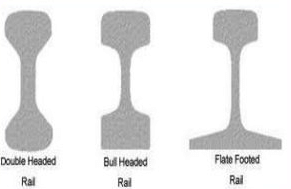Functions of Permanent Way | Civil Engineering Optional Notes for UPSC PDF Download
Permanent Way
Railway track is known as permanent way. It consists of rails, sleepers, ballast, fixtures and fastenings etc. It provides the permanent facility for safety and quick movement of normal commercial traffic between the starting and destination point.

Basic requirements of an ideal permanent way :
- The alignment of railway line should be correct.
- The track should possess sufficient elasticity, sufficient lateral rigidity and stiffness.
- The track should be designed such that the load of train distribute uniformly over it.
- The gauge of track should be correct and uniform.
- The friction between the wheels of rolling stock and rail should be minimum.
- Facilities of repair, replacement etc of damage portion of track should be adequate.
Components of permanent way :- rails, sleepers, fasteners and ballast.
1. RAIL: Rails are the members of the track laid in two parallel lines to provide an unchanging, continuous and level surface for the movement of trains. They are made of high-carbon steel.
Functions
- It provides a continuous and level surface for the movement of trains.
- They provide a smooth pathway with very little friction.
- They serve as a lateral guide for the wheels.
- They carry out the function of transmitting the load to a large area of the formation through sleepers and the ballast.
Types - there are three types of rails.
- Double headed rails (D. H. Rails)
- Bull headed rails (B.H. Rails)
- Flat footed rails (F. F. Rails)

2. SLEEPERS: Sleepers are the traverse members of the track placed below the rails to support and fix them in position.
Functions
- It holds the rails in their correct gauge and alignment.
- It gives a firm and supports the rails.
- It transfers the load from the rails to the ballast.
- It acts as an elastic medium between the rails and the ballast to absorb the blows and vibrations cause by moving loads.
- It provides longitudinal and lateral stability to the permanent way.
Types - the sleepers mostly used in Indian railways are
- Wooden sleepers
- Cost Iron sleepers
- Steel sleepers
- Concrete sleepers
3. BALLAST: Ballast is the granular material which is spread on the top of the railway foundation and around the sleepers.
Functions
- To hold the sleepers in position.
- To prevent the sleepers from lateral and longitudinal movement.
- To distribute the axle load uniformly from sleepers to a large area of formation.
- To drain rain water from the track.
- To provide easy means of maintaining the correct levels of the two rails in a track.
Types
- Broken stone
- Gravel
- Sand
- Ashes or cinders
- Moorum
4. FIXTURES AND FASTENINGS: Fixtures and fastenings are fittings require for joining of rails end to end also for fixing the rails to sleepers in a track.
Functions
- To join the rails end to end to form full length of track.
- To fix the rails to sleepers.
- To maintain the correct alignment of track.
- To provide proper expansion gap between rails.
- To maintain the required tilt of rails.
- To sets the points and crossings in proper position.
Types
- Fish plates
- Bearing plates
- Spikes
- Chairs
- Bolts
- Keys
- Anticreepers
|
350 videos|464 docs|2 tests
|
FAQs on Functions of Permanent Way - Civil Engineering Optional Notes for UPSC
| 1. What are the functions of Permanent Way? |  |
| 2. What is the significance of Permanent Way in railway infrastructure? |  |
| 3. How is the Permanent Way maintained and inspected? |  |
| 4. What are some common challenges faced in maintaining the Permanent Way? |  |
| 5. How does the Permanent Way contribute to the overall efficiency of train operations? |  |
|
350 videos|464 docs|2 tests
|

|
Explore Courses for UPSC exam
|

|
















